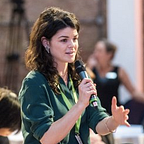Ideas Pt I: Where do ideas come from?
Coming up with an idea is hard. I’ve seen more than 1000 individuals go through the process of trying to come up with a high value, high growth startup idea. It’s often a counter-intuitive process that takes a couple of attempts.
So, what have we learnt from this? Where do the best ideas come from?
How to find a problem to solve
If you Google ‘where ideas come from’, it’s clear that an idea needs to solve a problem.
However, the hard bit is knowing what problems need to be solved.
How do you find the big, valuable problems that need to be solved?
Most advice focuses on seeking out day-to-day problems— what problems do you, your friends and the person on the street experience? You’re hungry, how do you get food quickly? You’re lonely, how do you get a date? You don’t like your housemates, how do you find a new place to live?
At Entrepreneur First, we don’t believe in using your day-to-day personal experience to identify problems. Why?
It creates:
- no founder advantage; it doesn’t ask what problems or areas you have an unfair advantage in. It removes any leverage that a founder may have due to their skills, expertise, or network
- undifferentiated ideas; many people experience the same problems on a daily basis e.g., food delivery, dating, music discovery
- undifferentiated solutions; without having expertise in a space, founders come up with undifferentiated solutions. This leads to crowded and competitive markets that are often won by whoever raises the most money (usually a US startup).
When we first started EF we encouraged founders to use this well tried method of identifying problems. It created ideas, but it didn’t create defensible and globally important ideas.
At EF, we have developed our own way to help founders identify the problems they are best suited to solve. It’s called Edge.
An individual’s Edge is their unfair advantage in solving a problem, compared to other founders.
Each individual who joins EF is encouraged to reflect and to think about their unique skills and experiences. We then help them think about how these could give them an unfair advantage within a particular market.
Edge based ideation
When you use your Edge you focus on finding your most valuable skill, or area of expertise. Typically this will be something you have developed during your academic or corporate career. You then use that as a starting point to find a problem.
Why?
There are two important questions every founder needs to answer about their idea. Every investor will want to understand:
- Why you?
- Why now?
Edge helps you answer both of these.
- Why you?
By using your Edge, you show that you have an unfair advantage in solving a problem compared to other founders in the space. You have the skills and expertise that means you can outperform other founders. This gives you a greater chance of winning in both the short and long term.
Your Edge shows that you have a deep connection to the idea you are developing. You’ve already dedicated serious time in your career to working in or around the problem you are trying to solve (either from a market or technical perspective).
And finally, using your Edge means you can focus on learning how to be an outstanding founder, rather than learning a technology or industry from scratch. Being a founder will be your steepest ever learning curve, give yourself a headstart by leveraging the areas where you have existing knowledge and experience.
2. Why now?
By using your Edge, you understand why the problem is ripe to solve now. You will have existing knowledge about why market, technology or regulatory changes make now the right time for this idea.
Read more about the benefits of Edge here.
What kind of ideas does Edge produce?
You aren’t going to found the next Snapchat, or Airbnb through Edge based ideation.
However, Google, Microsoft and Apple were born from the founders technical Edges. They were able to build something very few other people were able to build.
Edge is a reliable ideation model that works for those who have technical expertise (advanced degrees in a certain technology), or deep domain expertise. You can read about different types of Edge here.
If that’s whet your appetite, we can help…
If you’d like to find out more about Edge, read on here about how to know what kind of Edge you are, or alternatively join the next EF cohort in Europe or Asia.
We currently run programmes in Paris, Berlin, Hong Kong, Singapore and London, you can apply here.
